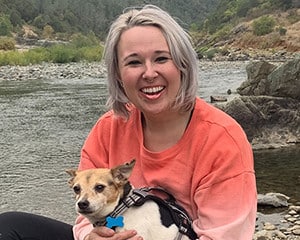Bachelor of Science Dental Hygiene Program Celebrates First Graduating Class
San Joaquin Valley College’s online Bachelor of Science degree Dental Hygiene (BSDH) program recently prepared twelve newly credentialed graduates for professional growth and development. This accelerated program, designed exclusively for online participation, can be completed in as few as 12-months.
What students may have missed in an in-person experience they readily exchanged for the convenience of home-study, ease of online student and faculty interaction and more comfortable test-taking. “I liked the online flexibility, so being a full-time hygienist, mom and wife, I could go at my own pace,” says Amanda Frank, one of those recent BSDH graduates.
To qualify for enrollment in SJVC’s BSDH program, applicants must have already earned an Associate of Science degree in Dental Hygiene (from a CODA-accredited program from an accredited institution), have a minimum of 80 units of lower division classes and hold a current, unencumbered credential licensure as a Registered Dental Hygienist (RDH) in the state of current employment.
“Most of our BSDH students are employed Dental Hygienists, and some are at home raising their kids,” says Brenda Kunz, Dental Hygiene Online Faculty. “I think they all aspire to do more within their profession.”
Even with Online study advantages, the BSDH program is rigorous. “I wanted to continue to grow as a clinician (Dental Hygienist) and I think I got more than I needed in the program (BSDH),” says Katherine Powers, recent graduate. “I knew I would continue as a clinician, but I’m thinking about what I might do some day if I ever left chairside. This program taught me more about how I might continue to grow.”
Career versatility is an attractive outcome for those who enroll in the BSDH program. “My goal is to teach dental assisting when I can no longer perform in clinical hygiene,” says Amanda. “I was a Dental Assistant for 17-years before I went to hygiene school. I’ve been a Dental Hygienist for 3-years and I’m ready for that next stage that will allow me to spend more time with my kids.”
An unexpected struggle for students in this new program came in the form of the pandemic that changed lives, plans and ways people moved, physically interacted and communicated with each other. “Covid added to the normal stress our students all felt,” says Brenda. “But they stepped up to the plate and performed online classes while they took on more responsibilities for safety in their workplace and more duties at home.”
During pandemic protocols BSDH students pulled together even tighter. “One beautiful thing that came out of it (restrictions Covid made necessary) in our program’s discussion forum was students sharing what they were going through in their offices and ideas and best practices to work safely in a Covid environment,” says Brenda. “They learned how to adapt to outside influences, use critical thinking skills and find strength needed to respond appropriately.”
Katherine agrees that increased student interaction was a nice surprise that the shared crisis invited. “I would say building a community with other students online was one of the best things. Hearing what other health care professionals are going through and stories about their specific professions. We had an array of medical professionals in some of the classes – Respiratory Therapists, Registered Nurses, Dental Hygienists. There was a lot of support and understanding.”
For one student, Covid struck home. “Two weeks into my program I was diagnosed with Covid, and I was miserable,” says Amanda, who was living in Idaho with her family. “I reached out to my instructors not knowing what to expect. They told me ‘Just stick with it and we will see what we can do’. “My symptoms were fairly mild, so I was able to push through it. Schools were shut down here so not only did I do my program, but my girls and I sat at the kitchen table and did our homework together.”
BSDH graduates felt they gained very specific career advantages and benefits. “I believe I elevated my expertise and that will help me in the future,” says Amanda. “I have become a more critical thinker. As medical professionals we can kind of put blinders on and not look at the bigger picture sometimes. So, now I take a step back and go over patient information and visual clues more thoroughly. This program made me think about why medical/dental professionals should be in better communication regarding the health of the patient.”
The first BSDH graduating class can deservedly take a bow to have accomplished so much in such a short time and under extraordinary external circumstances. Especially now that community health restrictions are becoming more relaxed, many more dental health providers are discovering this short-term educational step toward a major leap in their career aspirations.
“I believe our BSDH students were really impressed with this program that opened their eyes to what they can do with their licensure and scope of practice and how they can become leaders in the profession,” says Brenda. “They can make a bigger difference out in their communities, and they have the option to help teach and train the next generation of Dental Hygienists.”
Bachelor Degree in Dental Hygiene (BSDH) Pros and Cons
Those looking for career advancement and more opportunities may be considering a bachelor’s degree in dental hygiene (BSDH). Like all education, there are pros and cons to advancing your career. Learn if this degree option is right for you.
You might also like
More stories about
Request Information
All fields using an asterik (*) are required.


